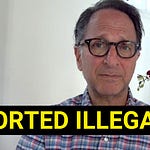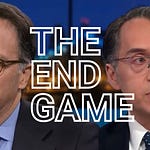This week saw the 80th anniversary of V-E Day—the liberation of Europe at the end of World War II. It also saw the continued expansion of overweening presidential power, with Stephen Miller toying with the suspension of habeas corpus by the White House, AND tweeting that "due process" does not apply to non-citizens and only in criminal cases (spoiler alert—that is not the law).
All this is to say that the power of the two branches of government that are not the executive branch—i.e., Congress and the Courts—has never been more important to our survival as a functioning and real democracy.
All of this was foretold in the lucid, dramatic, and prescient concurring opinion of Justice Jackson in the Youngstown Steel decision in 1952. Justice Jackson spoke eloquently about the perils of the increasing power of the American presidency, and the threat it posed to our democracy. I read from portions of that decision (which you can find here). You will not be disappointed, I promise you.
Here is a small piece to whet your appetite, from his famous concluding lines:
“With all its defects, delays, and inconveniences, men have discovered no technique for long preserving free government except that the Executive be under the law, and that the law be made by parliamentary deliberations.
Such institutions may be destined to pass away. But it is the duty of the Court to be last, not first, to give them up.”
Stay engaged.
—Andrew
P.S. The Youtube clip can be found here.
TRANSCRIPT
Hi, folks.
It is Saturday afternoon, and I wanted to talk to you about presidential power.
And this is going to be a reflection on the presidential immunity decision from last year, where so many of the justices talked about the need for a vigorous executive branch and executive authority. And they cited to the Youngstown case, a famous case that I’m going to talk about because I want to read to you some of that because it is really riveting.
And it’s particularly relevant to talk about sort of the growth of presidential power right now, where we have Stephen Miller talking about the potential suspension of habeas corpus by the White House—something that is highly questionable, that the prerequisites are there. There’s not an invasion, and it’s not clear at all that that’s something that the president can do, as opposed to something that Congress must do.
And for those of you who want to know what is habeas corpus—it’s called the Great Writ, and it is something that is fundamental to being able to validate our liberties, because it is an ability to bring a writ of habeas corpus to court to have it litigated, whether the state has the authority to hold you and seize you and take you.
And to suspend that is to basically allow the government to do whatever it wants.
For those of you who have listened to this and have been following what is going on in this country, just think about the many people who currently are detained here under immigration authorities—or supposed immigration authorities—and those people who have been seized and are currently in detention in a foreign country in El Salvador, in what’s supposed to be a horrendous prison.
And then just a couple days ago, we heard about a Tufts graduate student and a Columbia student who were released because they went to court, and pursuant to a habeas petition, the court said: no way, you get released.
So this idea of executive power and the court’s ability to check it are one that could not be more salient.
And those people who follow this know that the presidential immunity decision, while it dealt with sort of a criminal context of saying the president, when acting within his exclusive and core powers, cannot be criminally charged for those matters—it really sort of defined the scope of what are within the presidential powers quite broadly.
And that is the danger.
And I wanted to read to you some of the Youngstown concurrence. That is the case that is cited repeatedly by the Supreme Court to justify what it’s doing—and that could not be more of an insult to that Youngstown decision.
So bear with me, because this is—it really, I promise you—the language is riveting.
Youngstown was a case. It was decided in 1952 by the Supreme Court, and it dealt with President Truman trying to take over steel production in the United States.
The idea was that he needed the steel—and to take over the steel production—because of the war effort at that time. So, not a preposterous claim. Not outlandish. But it was trying to say this is something that the president needed to have the power to do.
And the challenge was that it was something that needed to be authorized by Congress, and the president couldn’t unilaterally do it.
So obviously, we’re in that mode of presidential power. We see currently the courts pushing back. We don’t see Congress pushing back on the usurpation of its power—CEG, the TikTok ban—which Congress passed and has not really enforced.
President Trump basically said, “I’m not going to enforce it.” Pam Bondi, the attorney general, said, “Don’t worry about violating it because we’re not going to go after you.”
That’s a perfect example of Congress sort of being asleep at the switch and saying: go ahead and violate our prerogatives.
And so this issue—of the three branches of government and how they operate—is critical to our times, and it was critical to the Youngstown case.
Could President Truman do this, or was he usurping congressional power?
And that issue went to the court—to the Supreme Court.
And there is a famous concurrence by Justice Jackson. And for those people who don’t know, it is particularly compelling because of Justice Harlan’s history.
Justice Jackson, before he was on the Supreme Court, was the chief prosecutor in the Nuremberg cases. So he was very aware firsthand of what happens in a totalitarian state—specifically Nazi Germany—and saw firsthand those evils, and the rule of law being used after the fact to hold people responsible.
But he saw what had happened there, and he really places this idea of presidential power—executive authority—in that historical context in words that could not be more relevant to our time.
And I should note that this is Saturday. It is just two days after VE Day, Victory in Europe Day. VE Day—this is the… I try not to do math in public, but… it is the 80th anniversary of VE Day, and that also makes this particularly poignant.
So I’m gonna read to you from this decision—and while this may seem like it’s gonna be boring, I promise you that this language is really riveting. And again, if you want to Google it, so read it for yourself—it’s beautiful.
I’m just going to read portions of it.
The case is Youngstown Sheet and Tube Company v. Sawyer.
And this is from Justice Jackson’s concurrence:
“That comprehensive and undefined presidential powers hold both practical advantages and grave dangers for the country will impress anyone who has served as legal advisor to a president in time of transition and public anxiety.
The tendency is strong to emphasize transient results upon policies such as wages or stabilization and lose sight of enduring consequences upon the balanced power structure of our republic.”
The balanced power structure of our republic.
So I’m gonna jump so that I’m not belaboring this too much.
“The example of such unlimited executive power that must have most impressed the forefathers was the prerogative exercised by George III,
and the description of its evils in the Declaration of Independence leads me to doubt that they were creating their new executive in his image.
Continental Europe examples were no more appealing.
And if we seek instruction from our own times, we can watch it only from the executive powers of those governments we disparagingly describe as totalitarian.”
“I cannot accept the view that this clause—the executive power clause—is a grant in bulk of all conceivable executive power,
but regard it as an allocation to the presidential office of the generic powers thereafter stated.”
In other words, that it’s limited. And he rejects the view of the executive at that time—that he is, or that the executive is entitled to all executive powers—as opposed to enumerated powers. It should be limited, in other words, in his view.
Let me continue.
He talks about various examples. He talks about the French example, the Great Britain example—but particularly poignant to me is his discussion of the German example of executive power.
Germany, after the First World War, framed the Weimar Constitution designed to secure her liberties in the Western tradition. However, the President of the Republic—that’s the President of the Republic of Germany—without concurrence of the Reichstag (that’s their legislative branch), was empowered temporarily to suspend any and all individual rights if public safety and order were seriously disturbed or endangered.
Sounds exactly what Stephen Miller was talking about—and saying they’re thinking about suspending the writ of habeas corpus.
So here he’s saying that the Reichstag, without their knowledge and concurrence, was empowered temporarily to suspend any and all individual rights if public safety and order were seriously disturbed or endangered.
This proved a temptation to every government, whatever its shade of opinion—and in 13 years, suspension of rights was invoked on more than 250 occasions.
Finally, Hitler persuaded President von Hindenburg to suspend all such rights, and they were never restored.
He talks about how the framers knew—knew what emergencies were, knew the pressures they engender for authoritative action—and they knew, too, how they afford a ready pretext for usurpation.
We may also suspect that they suspected—the founders suspected—that emergency powers would tend to kindle emergencies.
In a particularly poignant and relevant passage, he says, the contemporary foreign experience may be inconclusive as to the wisdom of lodging emergency powers somewhere in a modern government, but it suggests that emergency powers are consistent with free government only when their control is lodged elsewhere than in the executive who exercises them.
With respect to such powers, Justice Harlan says, such power either has no beginning or it has no end. If it exists, it needs submit to no legal restraint. I am not alarmed that it would plunge us straight away—I’m sorry—I am not alarmed that it would plunge us straight away into dictatorship, but it is at least a step in that wrong direction.
As to whether there is imperative necessity for such powers, it is relevant to note the gap that exists between the president’s paper powers and his real powers.
In other words, what he’s talking about here is what the Constitution says on paper should be the president’s limited powers—and what in fact he’s seeing in 1952 in terms of the growth of presidential power. That’s the gap between the president’s paper powers and his real powers.
The Constitution does not disclose the measure of the actual controls wielded by the modern presidential office. This is in 1952, and it’s only gotten worse in my view since then.
That instrument must be understood as an 18th century sketch of a government hoped for, not as a blueprint of the government that is. Vast accretions of federal power eroded from that reserved by the states have magnified the scope of presidential activity. Subtle shifts take place in the centers of real power that do not show on the face of the Constitution.
Executive power has the advantage of concentration in a single head in whose choice the whole nation has a part, making him the focus of public hopes and expectations. In drama, magnitude, and finality, his decisions so far overshadow any others that almost alone he fills the public eye and ear. No other personality in public life can begin to compete with him in access to the public mind through modern methods of communication.
By his prestige as head of state and his influence upon public opinion, he exerts a leverage—sorry—by his prestige as head of state and his influence upon public opinion, he exerts a leverage upon those who are supposed to check and balance his power, which often cancels their effectiveness.
This is so poignant to where we are now, and precisely because we see Donald Trump and the presidency having grown so much.
Moreover, Justice Harlan continues, rise of the party system has made a significant extra-constitutional supplement to real executive power. No appraisal of his necessities is realistic which overlooks that he heads a political system as well as a legal system. Party loyalties and interests, sometimes more binding than law, extend his effective control into branches of government other than his own, and he often may win as a political leader what he cannot command under the Constitution.
But I have no illusion that any decision by this court can keep power in the hands of Congress if it is not wise and timely in meeting its problems.
Meaning: this is his speaking to Congress. Remember, he is saying that the president—in this case, President Truman—cannot usurp Congress’s role in taking the steel mills. But he is now speaking to Congress:
I have no illusion that any decision by this court can keep power in the hands of Congress if it is not wise and timely in meeting its problems.
A crisis that challenged the president equally or perhaps primarily challenges Congress. If not good law, there was worldly wisdom in the maxim attributed to Napoleon that, quote, the tools belong to the man who can use them, unquote.
We may say that power to legislate for emergencies belongs in the hands of Congress, but only Congress itself can prevent power from slipping through its fingers.
CEG, the TikTok ban that I talked about as an example of what is going on now, which Congress let that power slip through its fingers.
And then in a final passage that is very famous, Justice Harlan says:
With all its defects, delays, and inconveniences, men have discovered no technique for long preserving free government except that the executive be under the law and that the law be made by parliamentary deliberations.
Such institutions may be destined to pass away, but it is the duty of the court to be last, not first, to give them up.
Such institutions may be destined to pass away, but it is the duty of the court to be last—not first—to give them up.
So I read this decision every year. It is a decision that obviously is particularly poignant and prescient and speaks to our moment in time.
I think that we are seeing so many judges do their duty and adhere to their oath of office and really comport with the import of what Justice Harlan was speaking about—and the need for the courts to stand up for rights and the Constitution and for the limited role of government, and particularly the limited role of the executive branch.
And sending out a clarion call, given his history and what he saw—particularly in his role as the chief prosecutor at Nuremberg—that what can happen if you have an executive branch that is not checked by the courts or by Congress, and what happens to our liberties.
John Locke famously said, “Where law ends, tyranny begins.”
And that is a call to all of us—to the judiciary, to the members of Congress—hear that. Members of Congress. And Justice Harlan signaled that just as well, much more than I could ever do, in words that are so much more powerful.
And then it is a clarion call to all of us, in terms of the need to believe and understand and act on that sense of limited government that makes us free.
So thank you very much again.
The full opinion of Justice Harlan is something you can Google and find readily. It is written in language that I think deliberately was something that non-lawyers and lawyers alike can appreciate.
And I wanted to read the passages that I thought were particularly compelling and relevant to this moment.
So thank you. Have a great weekend. And thank you for staying engaged.
Take care.













Share this post